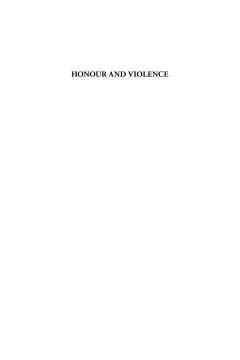
Additional Information
Book Details
Abstract
The practice of karo kari allows family, especially fathers, brothers and sons, to take the lives of their daughters, sisters and mothers if they are accused of adultery. This volume examines the central position of karo kari in the social, political and juridical structures in Upper Sindh, Pakistan. Drawing connections between local contests over marriage and resources, Nafisa Shah unearths deep historical processes and power relations. In particular, she explores how the state justice system and informal mediations inform each other in state responses to karo kari, and how modern law is implicated in this seemingly ancient cultural practice.
“By examining the circumstances of the violence itself, Shah offers insights into the complex factors motivating honour violence. This study is therefore a significant and welcome addition to the anthropology of honour that, I believe, will change the way we understand honour killings, not only in Pakistan but in any place where people cover up their violence by resorting to arguments of honour.” • Anthropos
“As the first sustained ethnographic analysis of accusations and killings in the name of honour, it is an important work that will be of interest, not just to legal anthropologists, but also to gender studies and the anthropology of the state.” • South Asia: Journal of South Asian Studies
“This is an extremely impressive achievement that makes a significant and substantial contribution to the ethnography of Pakistan and to the broader field of legal anthropology.” • Hastings Donnan, Queen's University of Belfast
“This landmark study offers a new perspective for understanding and dealing with honour-related violence, demonstrating that honour does not lead to violence but that such violence is strategy ‘masked in honour’.” • Alison Shaw, University of Oxford
“[Shah] presents her argument with fluency, creativity, and a rare humanistic sensitivity. This has all of the elements that allow a study to age into a classic.” • Mohammad Talib, Oxford Centre for Islamic Studies
Nafisa Shah is a member of the National Assembly, the Lower House of the Parliament of Pakistan. Shah began her public life as a journalist, later studying social and cultural anthropology at the Institute of Social and Cultural Anthropology, Oxford, where she received her D.Phil in 2011.
Table of Contents
| Section Title | Page | Action | Price |
|---|---|---|---|
| HONOUR AND VIOLENCE | i | ||
| Contents | vi | ||
| Figures, Maps and Tables | viii | ||
| Preface | x | ||
| Acknowledgements | xii | ||
| Note on Sindhi Language and Transliteration | xvi | ||
| Abbreviations | xvi | ||
| Introduction: Honour Violence, Law and Power in Upper Sindh | xviii | ||
| PART I. A FRONTIER OF HONOUR VIOLENCE | 28 | ||
| Chapter 1. Ghairat, Karo kari and the Spectacles of Violence | 30 | ||
| Chapter 2. Honour Violence, Law and Moral Power in Colonial Sindh | 58 | ||
| PART II. HONOUR, MORAL POWER AND LAW | 82 | ||
| Chapter 3. Karo kari, Wali and Family Violence | 84 | ||
| Chapter 4. Violence, Kin Groups and the Feud | 107 | ||
| PART III. NORMALIZING VIOLENCE | 136 | ||
| Chapter 5. Mediations on the Frontier | 138 | ||
| Chapter 6. The Criminal Justice and ‘Legal’ Contests of Honour | 168 | ||
| Chapter 7. The Sound of the Silence | 189 | ||
| Conclusion: Karyan Ja Kabrustan | 214 | ||
| Appendices | 224 | ||
| Glossary | 249 | ||
| Bibliography | 254 | ||
| Index | 270 |
